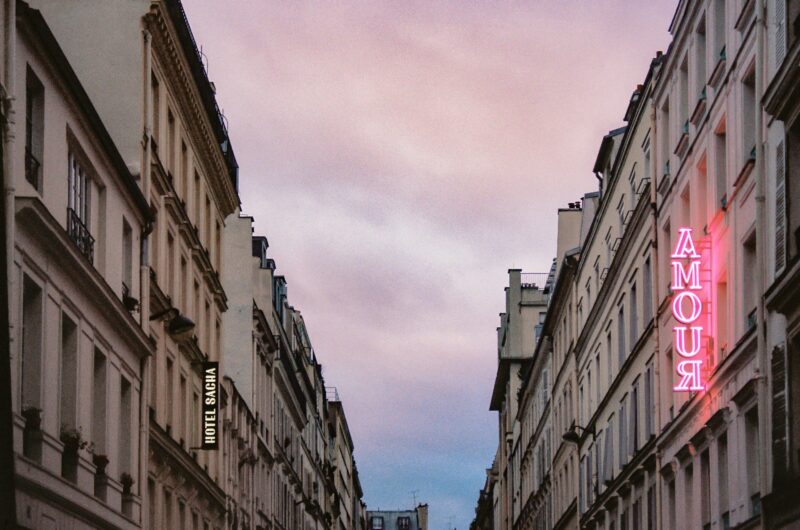“his mind moved with freedom and welcomed the unfamiliar. He had the same aristocratic sense of equality with all living creatures […]”
– Boris Pasternak, Doctor Zhivago
Apparently, the terrace suite on the sixth floor offers a panoramic view; Arc de Triomphe, Eiffel Tower… From this window, the view is of chestnut trees, sky, mansard rooftops.
Sun filters through the curtain, tinting the white lace gold, spilling light on everything. It trickles over china and unwrapped cutlery, pooling on the silver platter, reflecting the chandelier. He closes his eyes and sees the Eiffel Tower. He does not need the terrace suite.
The Eiffel Tower is just beyond these walls and his wildest dreams. A short stroll down Avenue Kléber, across the gardens of the Trocadéro, over the Pont d’Iéna. There. Really. He opens his eyes because the view, the light, the morning are making him giddy. He looks down, at the table.
Silver dome over eggs, au plat, medium cooked. Coffee pot. Jus d’orange frais covered by a frilled paper cap. Bread basket. Of course bread basket; Paris. Croissants, pains au chocolat, and every viennoiserie his imagination can summon, wrapped in cloth, scent wafting out, between butter and little jam pots.
Le Figaro, because morning. Saumon fumé on ice, Laurent-Perrier in an ice bucket,because first morning in Paris. White bath robe, because his skin has never known anything so soft. Bottle to lips, because of the intimacy of champagne before breakfast.
Conscious sips: one, two… That moment between fifteen and sixteen, when all men become gentlemen and all of life, a Sunday morning.
Effervescence, oak. Raphaelite paintings on panelled walls. He sinks into the cream and blue chair. Oriental rugs. Silence. He honours it, then, napkin on his lap, begins. He eats eggs and salmon and bread and alternates sips of champagne and coffee.
He makes the latter thick with sugar and milk and promise. The yolk is rich, bread light, and he has arrived in Paris. Colours and tastes and textures, both fine and opulent, worthy of the morning. He feasts on it, the meal, the room, the patch of sky, impossibly blue, from the window.
To the very last crumb and drop. He reclines in the bath robe. A moment longer, then he will take the bill and stand up.
He will go to the frayed coat, neatly lain on the bed, already made. He will reach into the pocket without the hole, on the left. Take every banknote and coin, all the money he has in the world, and set it next to the folded napkin, on the silver platter.
It will cover breakfast, the room, and a princely tip for the maid. He will bundle up the trash. In the bathroom, wipe the sink and fold the towels before stacking them underneath. Smooth the bed one more time, then step out of the robe and put on his only shirt, only trousers, only coat. His feet will memorize the silken rug before slipping into his only shoes without socks. One last look. He will float out,
penniless, giddy again, down the hall, past other rooms and other people’s platters and empty ice buckets. Past the flutes with lipstick on the rims. He will leave the hotel with nothing, with everything, on that first morning in Paris, turn left on Avenue Kléber,
except,
panic.
On the silver tray, by a small spoon — he did not order this! —ginned blueberries, sparkling violet, on iced buttermilk. He had done the sums, in his head, on a pad, had counted every cent! Hot chest, cold fingers. Pulse in his throat.
A calling card:
“Spécialité de la maison, with our compliments.”
And so the vagrant cries and eats glistening blueberries that remind him of once bananas, tangerines, a piano in a little sitting room. Other mornings fill his mouth, tangy and sweet. He used to sit on the floor and place his ear against the wood, feel the piano reverberate, and suck on tangerine segments. He had socks then. He will have socks. He feels the piano. It ripples through him. He will finish the blueberries and cream, lick the spoon, and go see the Eiffel Tower.
